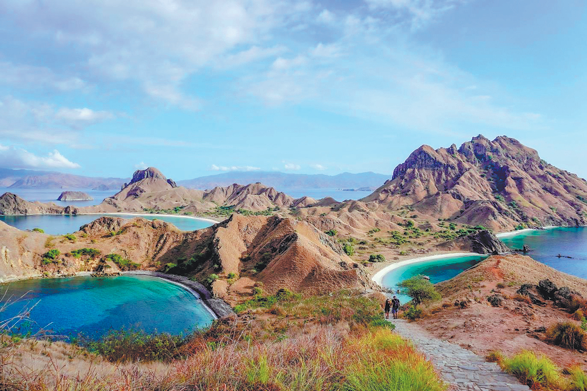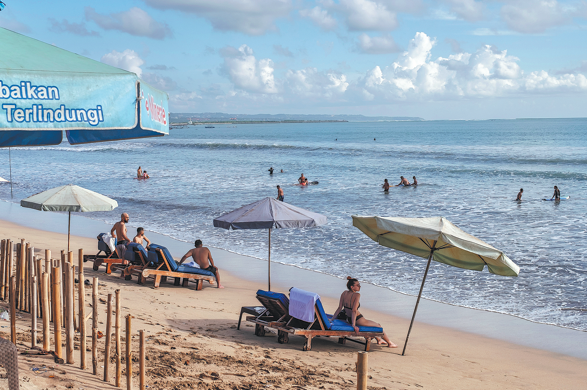Visa policies bring more visitors to Bali, beyond


Melania Dasilva, operational manager of L Bajo Hotel in eastern Indonesia, is among the tourism industry players who strongly welcome the government's ambitious policies to boost the country's travel sector.
She highlighted initiatives such as Visa on Arrival and e-VoA, which have increased tourist arrivals, including to her hometown of Labuan Bajo on the western tip of Flores Island in East Nusa Tenggara Province.
Currently, Chinese nationals are eligible for VoA when entering Indonesia, along with visitors from Germany, Japan, Jordan, Russia, the United States and Uzbekistan.
The government has also extended visa-free entry to all members of the Association of Southeast Asian Nations, as well as to travelers from Timor Leste; Suriname; Colombia; Hong Kong, China; Turkiye; and Brazil.
As operational manager of a non-star hotel in Labuan Bajo, Dasilva said she had previously seen only a handful of foreign tourists staying at her property. That has changed, with numbers now on the rise, boosting L Bajo Hotel's profile. The new wave of guests includes visitors from Australia, Japan and China.
Among Labuan Bajo's star-rated hotels, five-star ones mostly cater to foreign tourists — many arriving via Bali and planning trips to see the world's largest lizards at nearby Komodo National Park on Komodo Island, or to dive in the area's strikingly blue waters.
The number of Chinese visitors to Labuan Bajo has surged 350 percent over the past two years, partly because of the government's visaon-arrival policy, Charles Christian Mathaus, head of Labuan Bajo's immigration office, said in June.
In April, Chinese tourists accounted for nearly 29 percent of all foreign visitors to Labuan Bajo, detik.com reported.

Services at airports are also improving. Currently, there are fewer reports of long lines at the immigration gate of Bali's Ngurah Rai International Airport.
In the past, viral reports detailed visitors' "nightmare" experiences at Bali airport, claiming they had to wait hours in massive immigration lines. For Indonesia's tourism industry, such delays could discourage travelers from visiting the archipelago.
The country's new visa system, which includes Visa on Arrival and e-VoA, allows tourists and business visitors to stay for up to 30 days upon arrival.
Indonesia introduced VoA in 2016 and e-VoA in 2022. While VoA can be purchased at the airport, e-VoA can be booked in advance, giving travelers flexibility. Both options — particularly e-VoA — help reduce long waits at immigration counters.
In addition to Jakarta's Soekarno-Hatta Airport, Bali's Ngurah Rai Airport, and Manado's Sam Ratulangi Airport, international airports in Papua and South Papua provinces are also seeing growing numbers of travelers.
"With Visa on Arrival, visitors can more easily enter Indonesia and go to various destinations in our country, from Bali or Jakarta," said I Putu Winastra, head of the Bali chapter of the Association of the Indonesian Tours and Travel Agencies.
Winastra, however, disagrees that the visa policy will lead to a drop in the number of travelers staying in Bali, noting that tourists may also explore other destinations such as Java, Labuan Bajo, Lake Toba, and sites in Papua.
"Reports that Bali is experiencing overtourism is groundless because what happens is tourist overconcentration, not overtourism," Winastra added.
He admitted that overtourism can pose environmental risks, but added that "Bali is not just southern Bali", highlighting that the northern part of the "Island of the Gods "offers many promising destinations for visitors.
Xi He Can, deputy head of Mandarin language education at a large school in Tangerang, Banten Province, said she has visited Bali several times and also seen Lake Toba in North Sumatra.
She said she really loves these destinations, especially Bali's idyllic scenery, noting that "every time I go to Bali, my heart can be calm and relaxed, and return to nature".
"I love the culture of smiling among people, the slow pace of life and the human touch," said Xi, who has lived in Indonesia for 10 years after moving from a town in North China.
She added that she has no plans to visit Indonesia's more distant provinces but intends to encourage her relatives, friends and others in China to come to Indonesia for leisure.
Widiyanti Putri Wardhana, Indonesia's tourism minister, said the government has set a target of attracting 14 to 16 million foreign tourists this year, most of whom are likely to make Bali their first destination, as has been the case for decades.


































